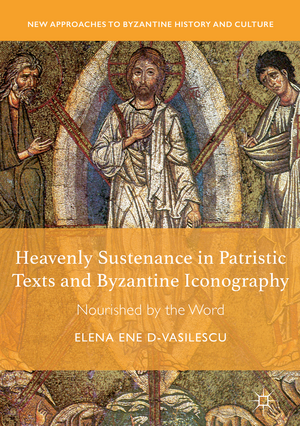Heavenly Sustenance in Patristic Texts and Byzantine Iconography: Nourished by the Word: New Approaches to Byzantine History and Culture
Autor Elena Ene D-Vasilescuen Limba Engleză Hardback – noi 2018
| Toate formatele și edițiile | Preț | Express |
|---|---|---|
| Paperback (1) | 447.99 lei 43-57 zile | |
| Springer International Publishing – 20 dec 2018 | 447.99 lei 43-57 zile | |
| Hardback (1) | 530.42 lei 43-57 zile | |
| Springer International Publishing – noi 2018 | 530.42 lei 43-57 zile |
Din seria New Approaches to Byzantine History and Culture
- 18%
 Preț: 722.43 lei
Preț: 722.43 lei - 15%
 Preț: 693.57 lei
Preț: 693.57 lei - 18%
 Preț: 791.57 lei
Preț: 791.57 lei - 15%
 Preț: 705.34 lei
Preț: 705.34 lei - 15%
 Preț: 532.56 lei
Preț: 532.56 lei - 15%
 Preț: 697.82 lei
Preț: 697.82 lei - 18%
 Preț: 891.96 lei
Preț: 891.96 lei - 9%
 Preț: 762.76 lei
Preț: 762.76 lei - 18%
 Preț: 722.89 lei
Preț: 722.89 lei - 18%
 Preț: 721.63 lei
Preț: 721.63 lei - 18%
 Preț: 724.63 lei
Preț: 724.63 lei - 18%
 Preț: 725.75 lei
Preț: 725.75 lei - 18%
 Preț: 721.01 lei
Preț: 721.01 lei - 18%
 Preț: 781.00 lei
Preț: 781.00 lei - 15%
 Preț: 691.91 lei
Preț: 691.91 lei - 18%
 Preț: 727.48 lei
Preț: 727.48 lei - 18%
 Preț: 732.70 lei
Preț: 732.70 lei - 15%
 Preț: 637.13 lei
Preț: 637.13 lei - 18%
 Preț: 735.84 lei
Preț: 735.84 lei - 18%
 Preț: 738.69 lei
Preț: 738.69 lei - 18%
 Preț: 953.65 lei
Preț: 953.65 lei - 18%
 Preț: 785.55 lei
Preț: 785.55 lei
Preț: 530.42 lei
Preț vechi: 624.03 lei
-15% Nou
Puncte Express: 796
Preț estimativ în valută:
101.53€ • 110.32$ • 85.34£
101.53€ • 110.32$ • 85.34£
Carte tipărită la comandă
Livrare economică 21 aprilie-05 mai
Preluare comenzi: 021 569.72.76
Specificații
ISBN-13: 9783319989853
ISBN-10: 3319989855
Pagini: 229
Ilustrații: XVIII, 196 p. 12 illus. in color.
Dimensiuni: 148 x 210 x 14 mm
Greutate: 0.5 kg
Ediția:1st ed. 2018
Editura: Springer International Publishing
Colecția Palgrave Macmillan
Seria New Approaches to Byzantine History and Culture
Locul publicării:Cham, Switzerland
ISBN-10: 3319989855
Pagini: 229
Ilustrații: XVIII, 196 p. 12 illus. in color.
Dimensiuni: 148 x 210 x 14 mm
Greutate: 0.5 kg
Ediția:1st ed. 2018
Editura: Springer International Publishing
Colecția Palgrave Macmillan
Seria New Approaches to Byzantine History and Culture
Locul publicării:Cham, Switzerland
Cuprins
Chapter 1. Introduction.- Chapter 2. The Connection Between Heavenly Nurture and Biological Sustenance in the Ancient World.- Chapter 3. Other Faith Encounters and Instances of Milk Nourishment.- Chapter 4. Anne’s Veneration as a Part of the Cult of the Saints.- Chapter 5. Patristic Texts about Saint Anne’s Role as an Intercessor with Regard to the Alleviation of People’s Barrenness and Healing in General.- Chapter 6. St. Anne as the Prototype of a Saint Connected with Healing and Nourishing in Various Literary Sources, Including the Apocrypha.- Chapter 7. Anna lactans/Galaktotrophousa Iconographic Motif Between the Twelfth and the Fourteenth Centuries.- Chapter 8. The Bogomils and Iconography.- Chapter 9. Conclusion.
Notă biografică
Elena Ene D-Vasilescu is a Tutor and a Research Fellow at the University of Oxford, UK. Her teaching and research focus on Patristics and Byzantine Studies. She is the editor of Devotion to St. Anne in Texts and Images (2018), and co-editor, with Mark Edwards, of Visions of God and Ideas on Deification in Patristics Thought (2016). She has also published other books and many articles; among the most recent of her articles there are “Generation (γενεά) in Gregory Nazianzen’s poem On the Son” (2017); “Early Christianity about the notion of time and the redemption of the world” (2017), and “Late Developments in Meta-Byzantine Icon-Painting” (2017).
Textul de pe ultima copertă
This book examines ideas of spiritual nourishment as maintained chiefly by Patristic theologians –those who lived in Byzantium. It shows how a particular type of Byzantine frescoes and icons illustrated the views of Patristic thinkers on the connections between the heavenly and the earthly worlds. The author explores the occurrence, and geographical distribution, of this new type of iconography that manifested itself in representations concerned with the human body, and argues that these were a reaction to docetist ideas. The volume also investigates the diffusion of saints’ cults and demonstrates that this took place on a North-South axis as their veneration began in Byzantium and gradually reached the northern part of Europe, and eventually the entirety of Christendom.
Caracteristici
Explores the manner in which Patristic authors refer to the religious needs of the human soul Argues that hagiographic iconography along the Via Egnatia from the twelfth to fourteenth centuries should be understood both within a biological and a spiritual framework Analyses aspects of the circulation of Bogomil ideas in the Balkans and the reaction in Byzantine iconography to their dissemination
